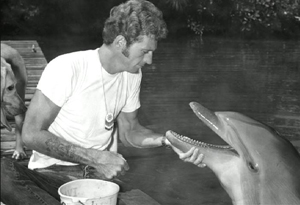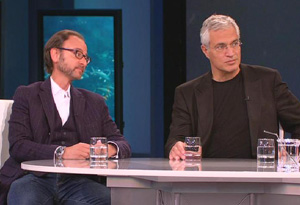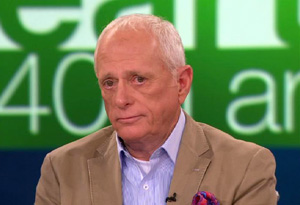The Cove's Shocking Discovery

There's a picturesque lagoon in Taiji, Japan, a small fishing village, where outsiders and cameras are forbidden. Shielded by steep cliffs, this body of water is protected by people who have a shocking secret.
In 2007, dolphin activist Ric O'Barry set out to expose what really happens here. Alongside director Louie Psihoyos and a dedicated team of filmmakers, Ric documented his mission in Taiji. "The fishermen told me, they said, 'If the world finds out what goes on here, we'll be shut down,'" Ric says.
What most people don't know is every year, from September to March, thousands of dolphins are slaughtered in this small body of water. Some are spared and sold to marine parks around the world, but the rest are killed for their meat. "They're looking for bottlenose dolphins, primarily," Ric says. "They're looking for Flipper."
Despite threat of arrest and tight security, Ric and Louie set out to capture this slaughter on film. Their footage eventually became The Cove, the 2009 Oscar®-winning documentary co-produced by Fisher Stevens.
Ric's mission is personal. He says he's desperately trying to put a stop to an industry he helped create.
In 2007, dolphin activist Ric O'Barry set out to expose what really happens here. Alongside director Louie Psihoyos and a dedicated team of filmmakers, Ric documented his mission in Taiji. "The fishermen told me, they said, 'If the world finds out what goes on here, we'll be shut down,'" Ric says.
What most people don't know is every year, from September to March, thousands of dolphins are slaughtered in this small body of water. Some are spared and sold to marine parks around the world, but the rest are killed for their meat. "They're looking for bottlenose dolphins, primarily," Ric says. "They're looking for Flipper."
Despite threat of arrest and tight security, Ric and Louie set out to capture this slaughter on film. Their footage eventually became The Cove, the 2009 Oscar®-winning documentary co-produced by Fisher Stevens.
Ric's mission is personal. He says he's desperately trying to put a stop to an industry he helped create.

In the 1960s, Ric captured and trained the dolphins for the hit TV series Flipper.
"I feel somewhat responsible because it was the Flipper TV series that created this multibillion-dollar industry," he says. "It created this desire to swim with them and kiss them and hold them and hug them and love them to death. It created all these captures."
After seven years of training dolphins, Ric says he realized these intelligent mammals were suffering in captivity. He became an activist the day he says Flipper took her own life. "She was really depressed," he says. "I could feel it. I could see it."
Since dolphins and other whales are not automatic air breathers like humans, Ric says every breath they take requires conscious effort. "They can end their life whenever life becomes too unbearable by not taking the next breath. She did that," he says. "She swam into my arms and looked me right in the eye and took a breath and didn't take another one."
The next day, Ric went to jail for trying to free a dolphin, and ever since, he's been on a mission to release dolphins from captivity.
"I feel somewhat responsible because it was the Flipper TV series that created this multibillion-dollar industry," he says. "It created this desire to swim with them and kiss them and hold them and hug them and love them to death. It created all these captures."
After seven years of training dolphins, Ric says he realized these intelligent mammals were suffering in captivity. He became an activist the day he says Flipper took her own life. "She was really depressed," he says. "I could feel it. I could see it."
Since dolphins and other whales are not automatic air breathers like humans, Ric says every breath they take requires conscious effort. "They can end their life whenever life becomes too unbearable by not taking the next breath. She did that," he says. "She swam into my arms and looked me right in the eye and took a breath and didn't take another one."
The next day, Ric went to jail for trying to free a dolphin, and ever since, he's been on a mission to release dolphins from captivity.

When Ric first started training dolphins, there were only three dolphinariums in the world. Now, you can swim with dolphins and see them in action in hundreds of zoos, water parks and vacation destinations around the world.
"[With] all of these captures, you help create the largest slaughter of dolphins on the planet. I have to see this end in my lifetime," Ric says. "Nobody has actually seen what takes place back there, and so the way to stop it is to expose it."
To document the slaughter, Ric and a dedicated group of filmmakers went undercover and risked everything to expose the truth of the cove. "The secret cove is a natural fortress. It's surrounded on three sides by steep cliffs," says Louie, the film's director. "High fences [are] surrounded by razor ribbon."
When the local Japanese government banned Louie's cameras, he found another way in. Louie asked Hollywood special effects masters to build fake rocks to conceal cameras, and a military expert created a balloon device that shot secret aerial footage. Then, under the cover of night, world-class divers planted sound equipment deep in the water.
"I wanted to have a three-dimensional experience of what's going on in that lagoon," Louie says. "The effort wasn't just to show the slaughter. You want to capture something that'll make people change."
After seven attempts and the scariest night of Louie's life, the cameras and microphones were in place. Then, at daybreak, the slaughter began. The cameras captured it all. "It was kind of a collective horror when we started to see the footage. It was mind-boggling," Louie says. "[Fishermen were] slaughtering every one they can get."
The blood of the slaughtered dolphins turned the blue water red.
"[With] all of these captures, you help create the largest slaughter of dolphins on the planet. I have to see this end in my lifetime," Ric says. "Nobody has actually seen what takes place back there, and so the way to stop it is to expose it."
To document the slaughter, Ric and a dedicated group of filmmakers went undercover and risked everything to expose the truth of the cove. "The secret cove is a natural fortress. It's surrounded on three sides by steep cliffs," says Louie, the film's director. "High fences [are] surrounded by razor ribbon."
When the local Japanese government banned Louie's cameras, he found another way in. Louie asked Hollywood special effects masters to build fake rocks to conceal cameras, and a military expert created a balloon device that shot secret aerial footage. Then, under the cover of night, world-class divers planted sound equipment deep in the water.
"I wanted to have a three-dimensional experience of what's going on in that lagoon," Louie says. "The effort wasn't just to show the slaughter. You want to capture something that'll make people change."
After seven attempts and the scariest night of Louie's life, the cameras and microphones were in place. Then, at daybreak, the slaughter began. The cameras captured it all. "It was kind of a collective horror when we started to see the footage. It was mind-boggling," Louie says. "[Fishermen were] slaughtering every one they can get."
The blood of the slaughtered dolphins turned the blue water red.

When he first saw the horrific footage of the slaughter, Ric says he saw a light at the end of the tunnel. "I knew it was going to be exposed," he says. "The light at the end of the tunnel was not an oncoming train. It was the sunshine. Finally, we're going to get this out to the world."
The documentary played in theaters across America, but Fisher, Louie and Ric also want it shown to millions of Japanese citizens who have not seen it. "It's not about us Westerners telling the Japanese, 'You've got to do this,'" Fisher says. "It's us Westerners showing the Japanese what's going on in their country and hopefully motivating them."
In July 2010, Fisher says a distribution company is planning to release the film in 20 Japanese theaters. To reach even more people, the filmmakers are also producing a 15-minute version in Japanese, which will be streamed for free on the Internet.
After watching The Cove, Ric says people will be shocked by the slaughter and inspired by the magnificence of these mammals. "It's not about intelligence. It's about consciousness. They are self-aware like humans are self-aware," Ric says. "I don't believe that the fishermen are aware of that."
The documentary played in theaters across America, but Fisher, Louie and Ric also want it shown to millions of Japanese citizens who have not seen it. "It's not about us Westerners telling the Japanese, 'You've got to do this,'" Fisher says. "It's us Westerners showing the Japanese what's going on in their country and hopefully motivating them."
In July 2010, Fisher says a distribution company is planning to release the film in 20 Japanese theaters. To reach even more people, the filmmakers are also producing a 15-minute version in Japanese, which will be streamed for free on the Internet.
After watching The Cove, Ric says people will be shocked by the slaughter and inspired by the magnificence of these mammals. "It's not about intelligence. It's about consciousness. They are self-aware like humans are self-aware," Ric says. "I don't believe that the fishermen are aware of that."

Despite some reports, a statement from the Japanese embassy says The Cove can be screened freely in Japan, and it may have been shown at the Tokyo International Film Festival.
The mayor of Taiji also shares his reaction to this award-winning film with Oprah Show producers. In the statement, he says: "The movie portrays false claims not based on science as if they are true. We regret that. It's important to mutually respect food culture based upon the understanding of long-standing traditions and circumstances in each region."
Over the past 10 years, however, Louie says all dolphin meat tested in Japan has been deemed toxic by Japanese standards. Ric says this meat contains very high levels of mercury.
"When Ric and I first got to Taiji, they were feeding it to school children because school lunch is compulsory. You're not allowed to bring your own, and you have to eat everything on your plate," Louie says. "We put a stop to that."
SeaWorld vice president Fred Jacobs also weighs in. "SeaWorld opposes the dolphin hunts documented in The Cove. We do not purchase any animals from these hunts," he says in a statement. "More than 80 percent of the marine mammals in our care were born in our parks. We haven't collected a dolphin from the wild in decades."
The mayor of Taiji also shares his reaction to this award-winning film with Oprah Show producers. In the statement, he says: "The movie portrays false claims not based on science as if they are true. We regret that. It's important to mutually respect food culture based upon the understanding of long-standing traditions and circumstances in each region."
Over the past 10 years, however, Louie says all dolphin meat tested in Japan has been deemed toxic by Japanese standards. Ric says this meat contains very high levels of mercury.
"When Ric and I first got to Taiji, they were feeding it to school children because school lunch is compulsory. You're not allowed to bring your own, and you have to eat everything on your plate," Louie says. "We put a stop to that."
SeaWorld vice president Fred Jacobs also weighs in. "SeaWorld opposes the dolphin hunts documented in The Cove. We do not purchase any animals from these hunts," he says in a statement. "More than 80 percent of the marine mammals in our care were born in our parks. We haven't collected a dolphin from the wild in decades."

Louie says The Cove isn't just about how dolphins, whales and humans affect our oceans. "It's about us trying to save humanity," he says.
This film is also the story of one hero's journey. "[Ric] proved to us that one person can make a difference," Louie says.
To help stop the dolphin slaughter, Ric encourages everyone to visit SaveJapanDolphins.org to sign his petition. "We need to get more signatures. We almost have a million for President Obama and for the Japanese government," he says. "That will be really helpful."
This film is also the story of one hero's journey. "[Ric] proved to us that one person can make a difference," Louie says.
To help stop the dolphin slaughter, Ric encourages everyone to visit SaveJapanDolphins.org to sign his petition. "We need to get more signatures. We almost have a million for President Obama and for the Japanese government," he says. "That will be really helpful."
Please note that Harpo Productions, Inc., OWN: Oprah Winfrey Network, Discovery Communications LLC and their affiliated companies and entities have no affiliation with and do not endorse those entities or websites referenced above, which are provided solely as a courtesy. Please conduct your own independent investigation (including an investigation as to whether any contributions are tax deductible) before donating to any charity, project or organization. This information is provided for your reference only.



